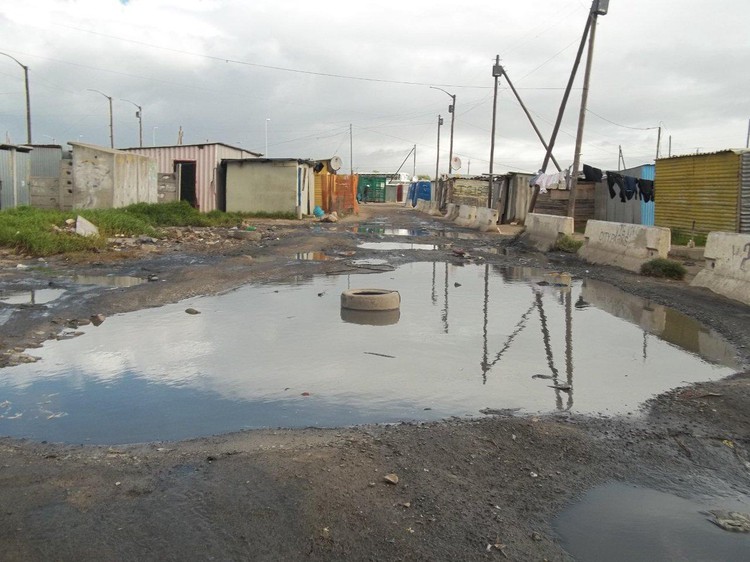Tsunami residents demand toilets and a clean neighbourhood
“Sometimes residents return from the bushes undressed after thugs rob them of their clothes and hard-earned cash.”
Shack-dwellers from Tsunami informal settlement in Delft marched to the Cape Town Civic Centre on Friday morning to demand that the municipality upgrades streets, installs flush toilets, connects electricity to shacks, clears illegal rubbish dumps and activates an unused mast light.
Community leader Kwanele Mcaleni said the City last cleaned the streets in August 2016. “Our streets have holes that are filled with dirty water, but the City is neglecting them. We want the City to clean and improve them,” he said.
Mcaleni said the shack-dwellers are tired of relieving themselves in chemical toilets. “On hot days you come out of a chemical toilet drenched in sweat.”
He said about 3,500 shack-dwellers used 210 chemical toilets in the informal settlement. “The chemical toilets become full before the time for janitors to empty them. As a result, residents use the bushes nearby,” said Mcaleni. “Sometimes residents return from the bushes undressed after thugs rob them of their clothes and hard-earned cash.”
“Currently, we don’t have a place where we can dump water after we have washed dishes, taken a bath and done laundry,” he said. “If we deposit grey water in the chemical toilets, they will become full before time, and we won’t have a place to relieve ourselves.”
He said the shack-dwellers wanted a mast light located in Tsunami to work. “The City set up the mast light two years ago, but it is not yet operational. Now it merely serves to ornament Tsunami.”
He said residents wanted the mast light to operate and deter thugs from committing crime at night. “Residents die as a result of crime, and it is not easy for cops to work at night because Tsunami is dark.”
Mcaleni said people living in formal houses want shack-dwellers to stop drawing electricity from their houses. “House owners say their electrical appliances burn because the shack-dwellers draw electricity from their electricity boxes,” said Mcaleni.
“Recently, the house owners pulled all electric cables from their houses. They are gatvol with the shack-dwellers who want to get electricity from them.”
Now the shack-dwellers want the City to devise a plan to install electricity in Tsunami on a temporary basis, he said. “We know the City intends to relocate us somewhere and use the land as a cemetery. However, we want it to give us electricity while we are still staying here.”
When GroundUp visited the informal settlement on Saturday, filthy water was stagnating in potholes in untarred streets between shacks. Illegal rubbish dumps looked as if they had been cleaned, but there was still an overpowering stench.
Shack-dwellers said they are fed-up with staying beside the muddy and dirty streets. “My son comes into contact with the dirty water when he plays ball outside. He often asks me to scratch him as the dirty water makes him itch,” said Nikiswa Cengimbo, 36, who has a two-year-old son.
She said, “The water stinks. When a car moves through the water, a powerful stench spreads around and comes into my shack.”
“When the sun is hot, flies move into my shack and bother us,” she said.
Councillor Stuart Diamond, acting Mayoral Committee member for Informal Settlements, Water and Sanitation, confirmed receiving a memorandum of demands from the shack-dwellers.
“I addressed the community stating that we will listen to their call and will engage them on their memorandum,” said Diamond. He said he had already taken the memorandum to City staff and they were dealing with the demands.
“We take the memorandum incredibly seriously, and we will look for ways to craft a solution for the people of Tsunami,” said Diamond.
© 2018 GroundUp.
This article is licensed under a Creative Commons Attribution-NoDerivatives 4.0 International License.
You may republish this article, so long as you credit the authors and GroundUp, and do not change the text. Please include a link back to the original article.



